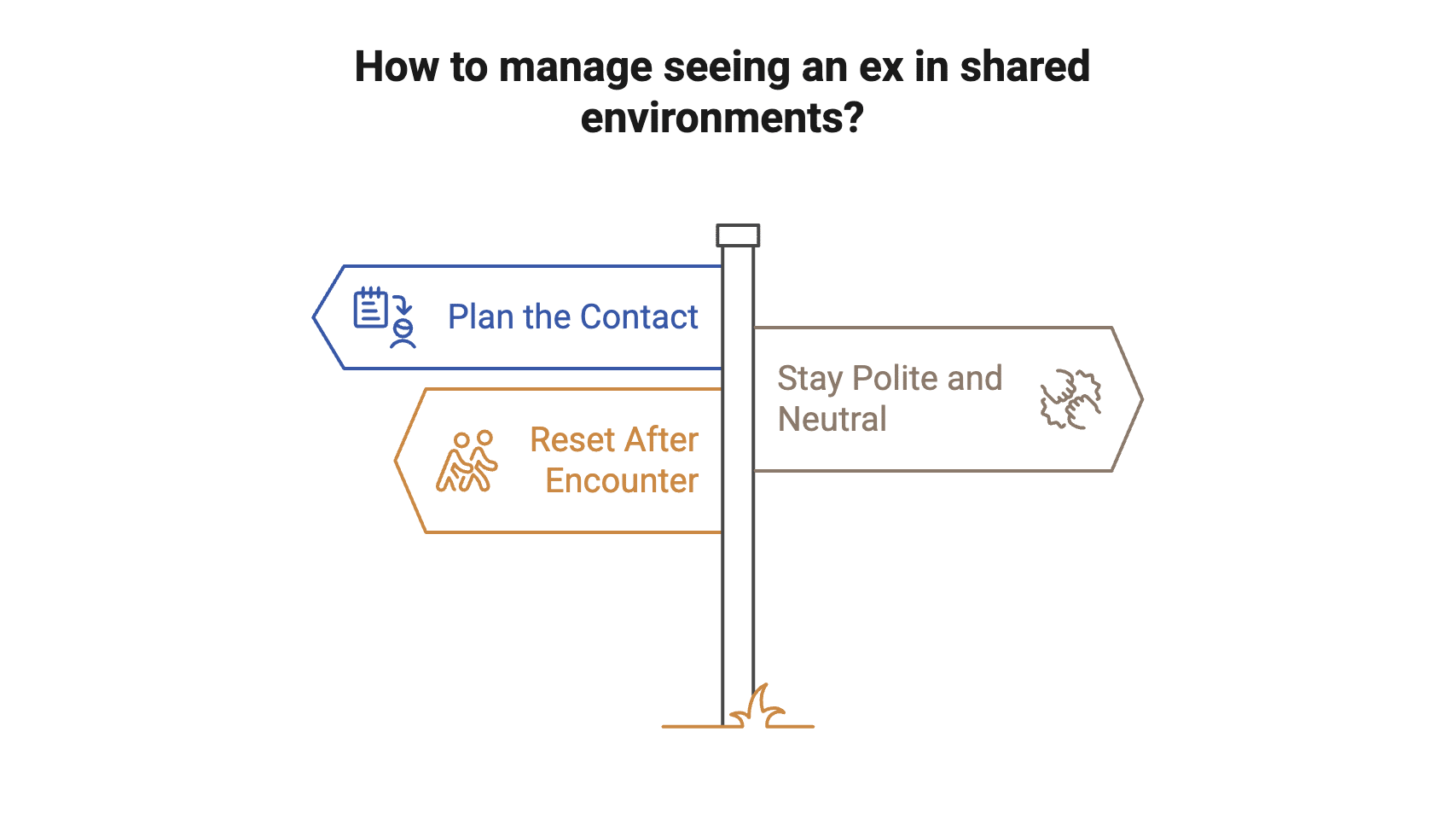How to Get Over a Breakup When You Still Love Them
When a relationship ends, loving them doesn’t switch off. You can care about someone and still heal. This guide keeps things simple and practical, with small steps you can start today. It’s common to have good and bad days during the healing process from a breakup, so be patient with yourself as you navigate this journey.
What should you do in the first 72 hours?
Keep life very simple. Protect sleep, eat on a schedule, and lean on one or two steady people. Reduce the noise that ramps up stress. Establish a new daily structure to provide a sense of normalcy and fill the void left by your ex.
- Set a sleep window (same bedtime/wake time). If sleep is rocky, routines from evidence‑based insomnia care help many people regain steadier nights.
- Make a basics plan: three meals, a daily walk, and screens off an hour before bed.
- Pick a support buddy and send one clear text: “Breakup just happened. Can I check in tonight and tomorrow?”
Early on, the goal isn’t “moving on.” It’s stabilizing your system so the shock can ease.
How do you stop the rumination spiral without pretending the love never happened?
Name the loop, then shift your focus on purpose. Rumination—replaying the breakup and every what‑if—keeps your stress response switched on. Research links perseverative thinking to prolonged stress, which is why it feels endless.
- Thought‑labeling: “That’s the ‘why did they do this?’ loop.”
- The 10‑minute window: set a timer, let the thoughts run, then move to a planned activity.
- Cognitive reappraisal: gently reframe a sticky thought (for example, “We had good moments, and this ending is also feedback about fit”). Studies show cognitive reappraisal can dial down intense feelings of love without denying real memories.
- Micro‑distractions that soothe: shower, short walk, tidy one drawer, hydrate. Avoid numbing that backfires (doom‑scrolling, extra drinking).
How do you set boundaries that work when you still want to text them?
Make contact rules you can actually follow. If possible, do a 2–4 week no‑contact window. If you must coordinate logistics, keep it brief, kind, and boring.
- Remove easy triggers: mute or archive, turn off lock‑screen previews, move photos to a hidden folder.
- Use a single logistics channel (one email thread or shared doc) instead of scattered late‑night texts.
- Prevent digital “checking”: after breakups, monitoring an ex on social media is linked to more distress. Make it harder to peep.
- Script for space: “I care about you. I need time to heal. For now, let’s handle only logistics by email.”
Boundaries aren’t a punishment. They’re a brace while you heal.
What daily habits help your brain recalibrate?
Small routines beat waiting to feel ready. Treat mood like a muscle you train with tiny reps.
- Move daily (walks count). Get daylight in your eyes within an hour of waking.
- Eat regular meals even if your appetite is off. Stable blood sugar helps steadier moods.
- Plan two social touchpoints a week (“two‑by‑two”: two people, two easy plans). Supportive connection predicts better adjustment after separations.
- Protect sleep (yes, again). Even modest sleep gains help you think clearly and ride waves.
These habits aren’t flashy. They quiet the alarm bells so you can think and feel without getting swept away.
How can rituals help you let go while honoring what was real?
Rituals give shape to feelings. You don’t have to erase memories to move forward; you can mark the change and carry the lessons. Keep it simple and private.
- Write a goodbye letter you won’t send. Say what mattered, what hurt, and what you want to wish them—then store it or shred it.
- Retire a token. Box a keepsake and put it out of sight, or take a photo and let the object go.
- Make a transition playlist. Archive the old one; start a new one for the next chapter.
The point isn’t to forget. It’s to name the ending so your mind can begin the next part.
When should you get extra support from a therapist in DC?
Reach out if sleep keeps crashing, appetite shifts, you feel hopeless, or work/school is sliding. For any thoughts of self‑harm, call 988 (U.S.) or local emergency services right away. Therapy gives you a steady hour to sort the push‑pull: skills to handle waves, perspective on patterns, and accountability for the habits that help. Our team in Dupont Circle works with breakups, grief, and mood concerns every week.
What if you have to see your ex (school, work, shared friends)?
Plan the contact. Decide your role, keep it brief, and set a calm exit.
- Before: choose who you’ll stand with, what you’ll say, and how long you’ll stay. Turn off social media previews.
- During: polite, neutral, and short. “Good to see you. I’m going to catch up with __.”
- After: do a reset (short walk, text a friend, simple meal, early night). If you spiral, use your 10‑minute window and reappraisal tools.
How do you date again without rebound regret?
Use a readiness check. Signs you’re close: fewer urges to check their feeds, more attention on your day, and you can picture a different future without a pit in your stomach.
- Low‑stakes plans (coffee walks > late nights).
- Set expectations in your profile or first messages: you’re easing back in and value honesty and kindness.
- Keep your anchors: sleep, meals, movement, and friends—dating should fit around your life, not replace it.
A 30‑day rebuild plan you can actually follow
Four short phases that stack and are easy to repeat.
- Week 1 — Stabilize: sleep window, three meals, a daily walk, two check‑ins with trusted people.
- Week 2 — Regulate: practice the worry window, thought‑labeling, and reappraisal; mute/limit triggers.
- Week 3 — Reconnect: schedule two social plans; try one new activity or class; refresh your space.
- Week 4 — Rebuild meaning: set one near‑term goal (school, work, health). Turn goals into tiny, scheduled actions you can check off.
Repeat any week as needed. Consistency beats intensity.
You can love them and still move forward
Healing isn’t forgetting; it’s building a life big enough to hold the past and the future. Every breakup presents an opportunity to redefine your identity beyond a relationship. If you’re in DC and want structured support, we’re here to help at Therapy Group of DC.
Frequently Asked Questions About How to Get Over a Breakup
How long does it usually take to heal from a breakup?
Healing from a breakup is a unique process for everyone, but research suggests that it often takes around three months to start feeling better. This healing journey involves processing emotional pain, accepting the reality of the situation, and gradually rebuilding your life without your ex. Patience and self-care during this time are essential. Using unused keywords and phrases, headings, and NLP entities, construct a brief FAQ section. Include an appropriate H2 title and make the questions H3 and the answers paragraph text.
Why do I still feel insecure and sad even though the breakup happened months ago?
Feeling insecure, sad, or afraid after a breakup is normal because your nervous system is adjusting to losing the connection you had with your partner. The emotional pain and sense of losing your old life can linger as you process the break and learn to live without that person. It’s important to acknowledge these feelings as part of the healing process.
How can I avoid falling into a toxic relationship after a breakup?
To avoid repeating patterns, take time for personal growth and self-reflection before entering a new relationship. Recognize the signs of a toxic relationship, such as feeling insecure or experiencing emotional pain, and set clear boundaries. Healing fully and understanding your emotional needs will help you make healthier choices moving forward.
What are some simple things I can do to support my mental health after a breakup?
Small routines like maintaining regular sleep schedules, eating balanced meals, moving daily, and limiting contact with your ex can help stabilize your mental health. Surrounding yourself with supportive friends and family, writing down your thoughts, and engaging in hobbies you love are also helpful ways to regain a sense of happiness and purpose.
Is it normal to still have good memories and feel attached after a breakup?
Yes, it’s normal to hold onto good memories and feel attached to your ex-partner. However, it’s important to balance these memories with acceptance of the breakup’s reality. Over time, focusing on creating new memories and shifting your attention to your own life will help you move forward and heal from the sadness and anger.


